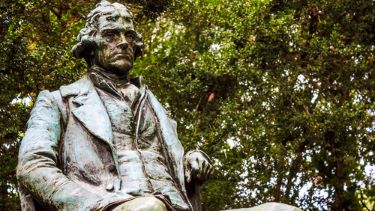Did “separation of church and state”
originate with the Constitution?

The phrase “separation of church and state” does not appear in the Constitution. It traces back to a letter written by Thomas Jefferson to the Danbury Baptists on January 1, 1802, in which he reassured the Baptists that their religious freedom would be protected. He was assuring them that the government would not interfere with them freely practicing their religion. His letter included: “I contemplate with sovereign reverence that act of the whole American people which declared that their legislature should ‘make no law respecting an establishment of religion, or prohibiting the free exercise thereof,’ thus building a wall of separation between Church and State.”
The Supreme Court has cited Jefferson’s letter in key cases it has decided. To read Jefferson’s letter on the Library of Congress site:
https://www.loc.gov/loc/lcib/9806/danpre.html
Religion is discussed in the first amendment, which states:
Congress shall make no law respecting an establishment of religion, or prohibiting the free exercise thereof; or abridging the freedom of speech, or of the press; or the right of the people peaceably to assemble, and to petition the Government for a redress of grievances.
“Congress shall make no law respecting an establishment of religion …” is called the Establishment Clause.
Some have argued that this clause is only intended to prohibit the establishment of a single national religion or the preference of one religion over another. Others have argued that this clause prohibits the government from promoting religion in general as well as the preference of one religion over another.
Although the Supreme Court has issued various interpretations of this clause, it is likely that the majority of Supreme Court Justices will continue to rule that neutrality toward religion is the guiding principle, which means not favoring one religion over another and not favoring religion over non-religion and vice versa.
“Congress shall make no law … prohibiting the free exercise thereof …” is called the free-exercise clause of the First Amendment.
The Supreme Court has interpreted this clause to mean that the freedom to believe is absolute, but the ability to act on those beliefs is not, such as human sacrifice or polygamy is not allowed.
